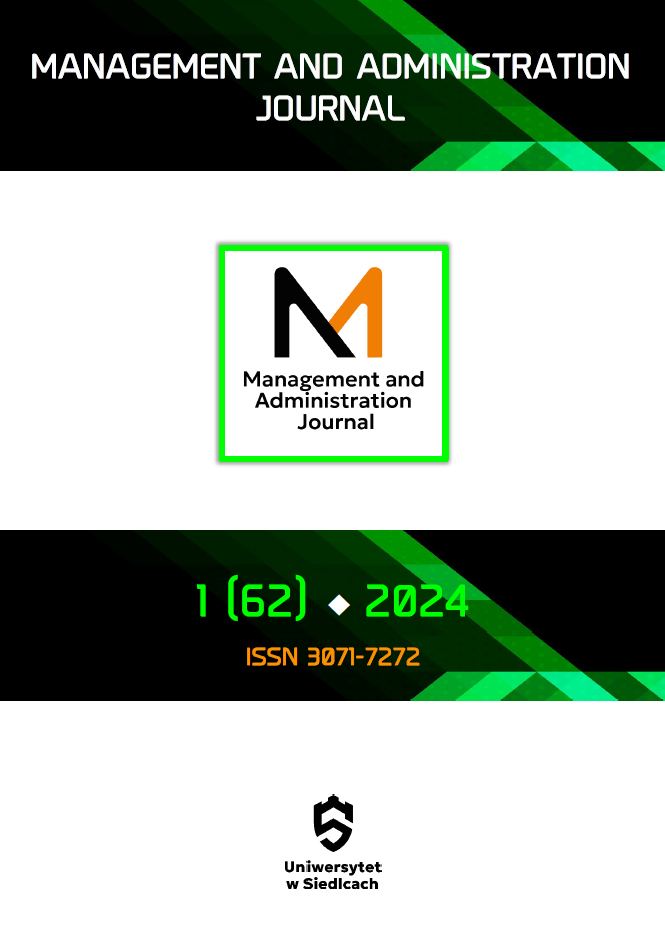TRANSFORMACJA ENERGETYCZNA – WYZWANIA DLA POLSKI WOBEC DOŚWIADCZEŃ KRAJÓW UE
DOI:
https://doi.org/10.34739/maj.2024.01.09Słowa kluczowe:
energia odnawialna, produkcja energii, czysta energia, bezpieczeństwo energetyczne, wpływ zużycia energii na środowiskoAbstrakt
Bezpieczeństwo energetyczne jest podstawą naszego kraju i jest niezbędne dla naszej gospodarki, społeczeństwa i suwerenności. Jego istotą jest zapewnienie ciągłego dostępu do energii w ilości wystarczającej do zaspokojenia potrzeb naszego kraju, niezależnie od ewentualnych zakłóceń i zagrożeń. Konsekwencje działań wojennych rozpoczętych przez Rosję w 2022 roku sięgają daleko poza granicę Ukrainy. Ceny energii w całej Europie znacząco wzrosły i wyraźnie pokazały, że należy wyprodukować znacznie więcej zielonej energii. Odnawialne źródła energii, w tym energia wiatrowa, odegrały ważną i pozytywną rolę w ograniczeniu wzrostu cen energii. Celem artykułu jest przygotowanie prognozy produkcji energii z odnawialnych źródeł energii z wykorzystaniem modeli predykcyjnych opartych na aproksymacji funkcyjnej. Produkcja energii wiatrowej jest niepewna i w dużym stopniu uzależniona m.in. od czynników atmosferycznych, takich jak siła wiatru. Warunki wytwarzania energii elektrycznej oraz cena energii końcowej mogą pogłębiać rozbieżności w rozwoju społeczno-gospodarczym krajów i przyczyniać się do polaryzacji świata.
Pobrania
Bibliografia
Açar, T.S., Öz, N.A. (2020). The Determination of Optimal Cluster Number by Silhouette Index at Clustering of the European Union Member Countries and Candidate Turkey by Waste Indicators. Pamukkale Univ Muh Bilim Derg 26(3), p. 481-487.
Bajan, B., Łukasiewicz, J., Mrówczyńska-Kamińska, A. (2021). Energy Consumption and Its Structures in Food Production Systems of the Visegrad Group Countries Compared with Eu-15 Countries. Energies 14.
Belkin, P. (2008). The European Union’s energy security challenges. Connections 7(1).
Brodny, J., Tutak, M. (2020). Analyzing Similarities between the European Union Countries in Terms of the Structure and Volume of Energy Production from Renewable Energy Sources. Energies 13.
Bryden, I.G., Couch, S.J. (2006). ME1‒marine energy extraction: tidal resource analysis. Renewable Energy 31(2).
Chudy-Laskowska, K., Pisula, T. (2022). An Analysis of the Use of Energy from Conventional Fossil Fuels and Green Renewable Energy in the Context of the European Union’s Planned Energy Transformation. Energies 15.
Elmassah, S., Biltagy, M., Gamal, D. (2022). Framing the role of higher education in sustainable development: a case study analysis. International Journal of Sustainability in Higher Education 23(2).
Famulska, T., Kaczmarzyk, J., Grząba-Włoszek, M. (2022). Environmental Taxes in the Member States of the European Union –Trends in Energy Taxes. Energies 15.
Harrison, G.P., Wallace, A.R. (2005). Climate sensitivity of marine energy. Renewable Energy 30(12).
Kacperska, E., Łukasiewicz, K., Pietrzak, P. (2021). Use of Renewable Energy Sources in the European Union and the Visegrad Group Countries-Results of Cluster Analysis. Energies 14.
Kastanaki, E., Giannis, A. (2022). Energy decarbonisation in the European Union: Assessment of photovoltaic waste recycling potential. Energy 192, p. 1-13.
Khan, S.A.R., Ibrahim, R.L., Al-Amin, A.Q., Yu, Z. (2022). An Ideology of Sustainability under Technological Revolution: Striving towards Sustainable Development. Sustainability 14.
Larsson, J., Elofsson, A., Sterner, T., Åkerman, J. (2019). International and national climate policies for aviation: a review. Climate Policy 19(6).
Lowitzsch, J., Hoicka, C.E., van Tulder, F.J. (2020). Renewable Energy Communities under the 2019 European Clean Energy Package – Governance Model for the Energy Clusters of the Future? Renew. Sustain. Energy Rev. 122.
Martins, F., Felgueiras, C., Smitkova, M., Caetano, N. (2019). Analysis of Fossil Fuel Energy Consumption and Environmental Impacts in European Countries. Energies 12.
Mehrtash, M., Capitanescu, F., Heiselberg, P.K., Gibon, T., Bertrand, A. (2020). An Enhanced Optimal PV and Battery Sizing Model for Zero Energy Buildings Considering Environmental Impacts. IEEE Trans. Ind. Appl. 56.
Mendonça, M., Lacey, S., Hvelplund, F. (2009). Stability, participation and transparency in renewable energy policy: Lessons from Denmark and the United States. Policy and Society 27(4).
Ohlhorst, D. (2015). Germany’s energy transition policy between national targets and decentralized responsibilities. Journal of Integrative Environmental Sciences 12(4).
Ostasiewicz, S., Rusnak, Z., Siedlecka U. (2011). Statistics, Wrocław: WUE.
Oteman, M., Wiering, M., Helderman, J.K. (2014). The institutional space of community initiatives for renewable energy: a comparative case study of the Netherlands, Germany and Denmark. Energy, Sustainability and Society 4(1).
Publications Office of the EU (europa.eu).
Rakowska, J., Ozimek, I. (2021). Renewable energy attitudes and behaviour of local governments in Poland. Energies 14(10).
Rokicki, T. Perkowska, A. (2021). Diversity and Changes in the Energy Balance in EU Countries. Energies 14.
Safarzynska, K., van den Bergh, J.C. (2011). Industry Evolution, Rational Agents and the Transition to Sustainable Electricity Production. Energy Policy 39.
Salami, R., Kordi, M., Bolouri, P., Delangiz, N., Lajayer, B.A. (2011). Algae-Based Biorefinery as a Sustainable Renewable Resource. Sustain 1, p. 1349-1365.
Sinsel, S.R., Riemke, R.L., Hoffmann, V.H. (2020). Challenges and solution technologies for the integration of variable renewable energy sources ‒ a review. Energy 145.
Sovacool, B.K., Brown, M.A. (2010). Competing dimensions of energy security: an international perspective. Annual Review of Environment and Resources 35.
Stec, M., Grzebyk, M. (2022). Statistical Analysis of the Level of Development of Renewable Energy Sources in the Countries of the European Union. Energies 15.
Tyler, S., Beiter, P., Duffy, P. (2020, 2019). Cost of wind energy review. Golden, CO: National Renewable Energy Laboratory. NREL/TP-5000-78471.
Wolde-Rufael, Y., Weldemeskel, E.M. (2020). Environmental policy stringency, renewable energy consumption and CO2 emissions: Panel cointegration analysis for BRIICTS countries. Green Energy 17, p. 568-582.
www.eera-dtoc.eu/wp-content/uploads/files/D7-20-EERADTOC-final-summary-report-web-version.pdf [accessed 10.03.2023].
www.gov.pl/ Poland's energy policy until 2040.
www.statista.com/topics/6254/coronavirus-covid-19-impact-on-the-energy-industry.
www.statista.com/statistics/561888/global-daily-oil-demand-by-region-due-to-covid-19.
Zdonek, I., Tokarski, S., Mularczyk, A., Turek, M. (2022). Evaluation of the Program Subsidizing Prosumer Photovoltaic Sources in Poland. Energies 15.
Pobrania
Opublikowane
Numer
Dział
Licencja
Prawa autorskie (c) 2024 Management and Administration Journal

Utwór dostępny jest na licencji Creative Commons Uznanie autorstwa – Użycie niekomercyjne – Bez utworów zależnych 4.0 Międzynarodowe.





